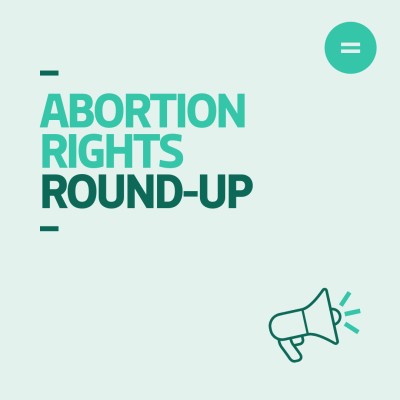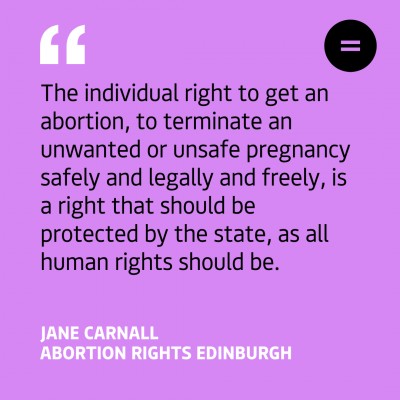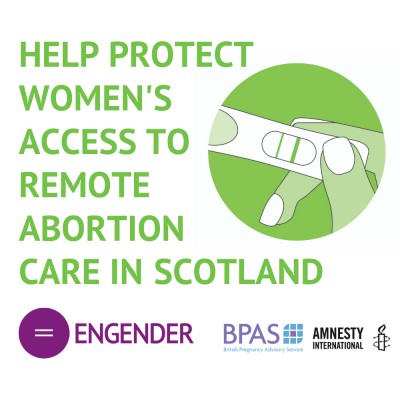Engender blog
Exploring legislation on buffer zones in Northern Ireland
-400.png)
We're pleased to be working with student Beatriz Morganti Brandão to research how the International Covenant on Economic, Social and Cultural Rights can be used to protect women in Scotland. In this blog post, she explores the upcoming UK Supreme Court decision on buffer zones in Northern Ireland and how it could impact on women’s rights in Scotland.
A hot topic in Scotland today is the regulation of ‘buffer zones’ (protest-free areas) outside abortion clinics. These zones aim to protect women seeking and providing abortion services from escalating harassment and intimidation by anti-choice protestors. Gillian Mackay MSP has recently launched a consultation on a project to legislate on buffer zones around clinics in Scotland. The consultation is open until 11th August and we encourage all those wishing to improve women’s rights in Scotland to contribute. You can fill in the consultation online here.
Abortion Rights Round-Up
 What's been happening with reproductive rights over the past month? Engender members are kept up-to-date with this news through our weekly Friday Feminist Five newsletter, but in this post we've collated an update for non-members too. If you'd like to receive the weekly newsletter you can join Engender as a member here.
What's been happening with reproductive rights over the past month? Engender members are kept up-to-date with this news through our weekly Friday Feminist Five newsletter, but in this post we've collated an update for non-members too. If you'd like to receive the weekly newsletter you can join Engender as a member here.
News from the US continues to cause alarm for defenders of women’s reproductive rights, as we wait for the decision on whether or not Roe v Wade will be effectively overturned by the Supreme Court. While it’s been heartening to see protests, rallies and other actions to defend the right to choose (we particularly liked the New York Magazine’s state-by-state guide to accessing abortions, and the creative legislation in Austin, Texas), the reality of what may happen across the US in a couple of months is really scary.
In the last 25 years, 50 countries have moved to amend their laws to improve access to abortion, and this would represent a significant step backwards.
GUEST POST: Stand with the pro-choice voice across the US
Feminist across the world have continued to watch in horror as reproductive rights are under attack in the USA. In this blog, Jane Carnall, an activist with Abortion Rights Edinburgh sets out why we must act in solidarity with those seeking access to abortion in the states.

This month, a law passed by the Republican majority governing Texas came into force, and effectively banned all legal abortion in the state of Texas after six weeks gestation - that is, well before most people would even realise they're pregnant.
On 2nd October, Abortion Rights Scotland is taking part in the international day of action against this legislation.
Telemedical abortion services: joint letter to Maree Todd MSP, Minister for Public Health, Women's Health, and Sport
-400.png)
Today Engender and the British Pregnancy Advisory Service (BPAS) have, together with 25 women's organisations, human rights bodies, and healthcare providers, written to the Scottish Government asking them to make telemedical abortion services permanent in Scotland.
In March 2020, the Scottish Government provided temporary permission for telemedical early medical abortion care. This ensured that women and pregnant people all over Scotland could continue to access abortion care without travel to a clinic, decreasing their own and clinic staff’s risk of exposure to Covid-19. Our letter asks that this change be made permanent, continuing to provide women with as much choice as possible in accessing abortion care.
Have your say on the future of remote abortion care in Scotland

One of the (very) few positives from this year has been seeing how, when pushed, changes can be made to make people's lives easier. Workplace flexibility which disabled people's organisations have been demanding for years, priority shopping times for older people or those who experience sensory overload, and massive efforts to provide accommodation for those in need.
One of those changes has been a shift in how women (as well as trans men and non-binary people) have been able to access abortion care. We saw the start of this change back in 2017 when the Scottish Government enabled women to take one of the two pills needed to have an abortion (mifepristone and misoprostol) at home. This was already a big improvement for women, meaning they didn't need to travel to a clinic twice in a few days, with all of the childcare, work arrangements, travel costs and other inconveniences that created.
Downloads
 Engender Briefing: Pension Credit Entitlement Changes
From 15 May 2019, new changes will be introduced which will require couples where one partner has reached state pension age and one has not (‘mixed age couples’) to claim universal credit (UC) instead of Pension Credit.
Engender Briefing: Pension Credit Entitlement Changes
From 15 May 2019, new changes will be introduced which will require couples where one partner has reached state pension age and one has not (‘mixed age couples’) to claim universal credit (UC) instead of Pension Credit.
 Engender Parliamentary Briefing: Condemnation of Misogyny, Racism, Harassment and Sexism
Engender welcomes this Scottish Parliament Debate on Condemnation of Misogyny, Racism, Harassment and Sexism and the opportunity to raise awareness of the ways in which women in Scotland’s inequality contributes to gender-based violence.
Engender Parliamentary Briefing: Condemnation of Misogyny, Racism, Harassment and Sexism
Engender welcomes this Scottish Parliament Debate on Condemnation of Misogyny, Racism, Harassment and Sexism and the opportunity to raise awareness of the ways in which women in Scotland’s inequality contributes to gender-based violence.
 Gender Matters in Social Security: Individual Payments of Universal Credit
A paper calling on the Scottish Government to automatically split payments of Universal Credit between couples, once this power is devolved to the Scottish Parliament.
Gender Matters in Social Security: Individual Payments of Universal Credit
A paper calling on the Scottish Government to automatically split payments of Universal Credit between couples, once this power is devolved to the Scottish Parliament.
 Gender Matters Manifesto: Twenty for 2016
This manifesto sets out measures that, with political will, can be taken over the next parliamentary term in pursuit of these goals.
Gender Matters Manifesto: Twenty for 2016
This manifesto sets out measures that, with political will, can be taken over the next parliamentary term in pursuit of these goals.
 Scottish NGO Briefing for UN Special Rapporteur on Violence Against Women
Joint briefing paper for the UN Rapporteur on Violence Against Women.
Scottish NGO Briefing for UN Special Rapporteur on Violence Against Women
Joint briefing paper for the UN Rapporteur on Violence Against Women.

Newsletter
Sign up to receive our newsletter here:
Sign up to our mailing list
Receive key feminist updates direct to your inbox: